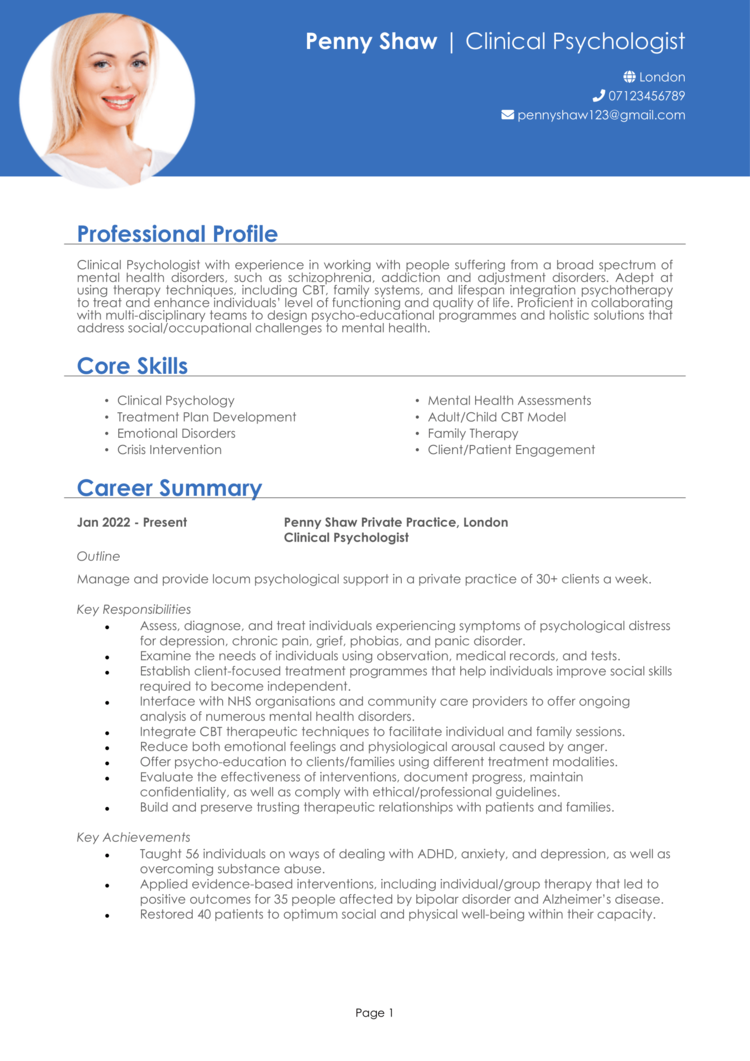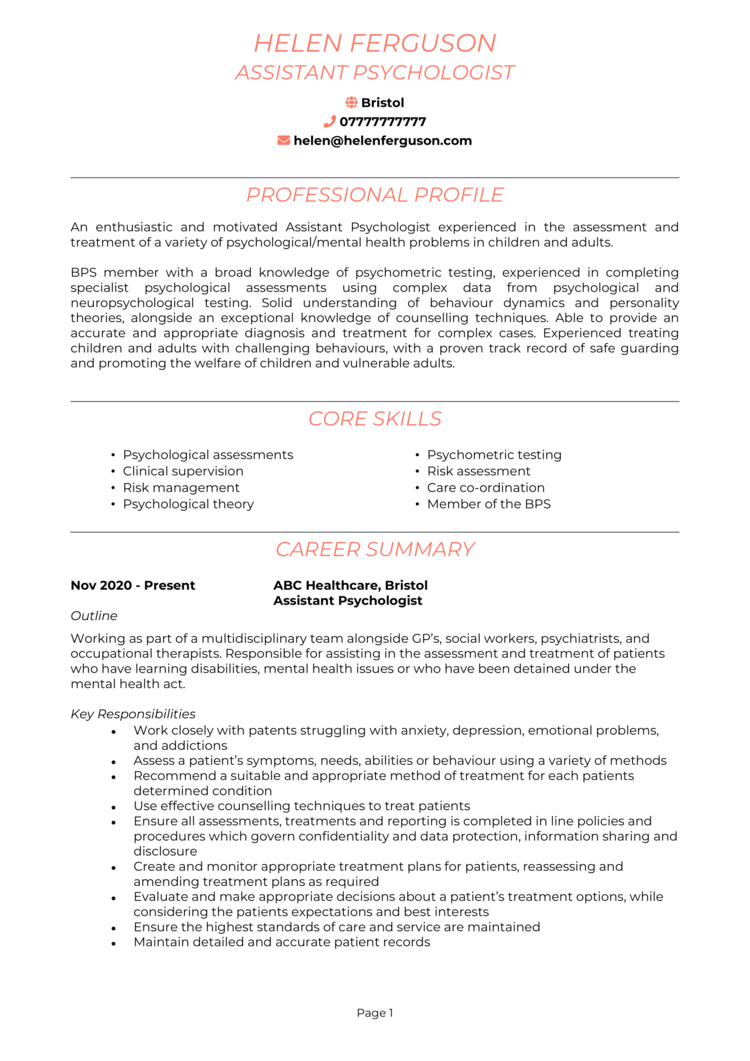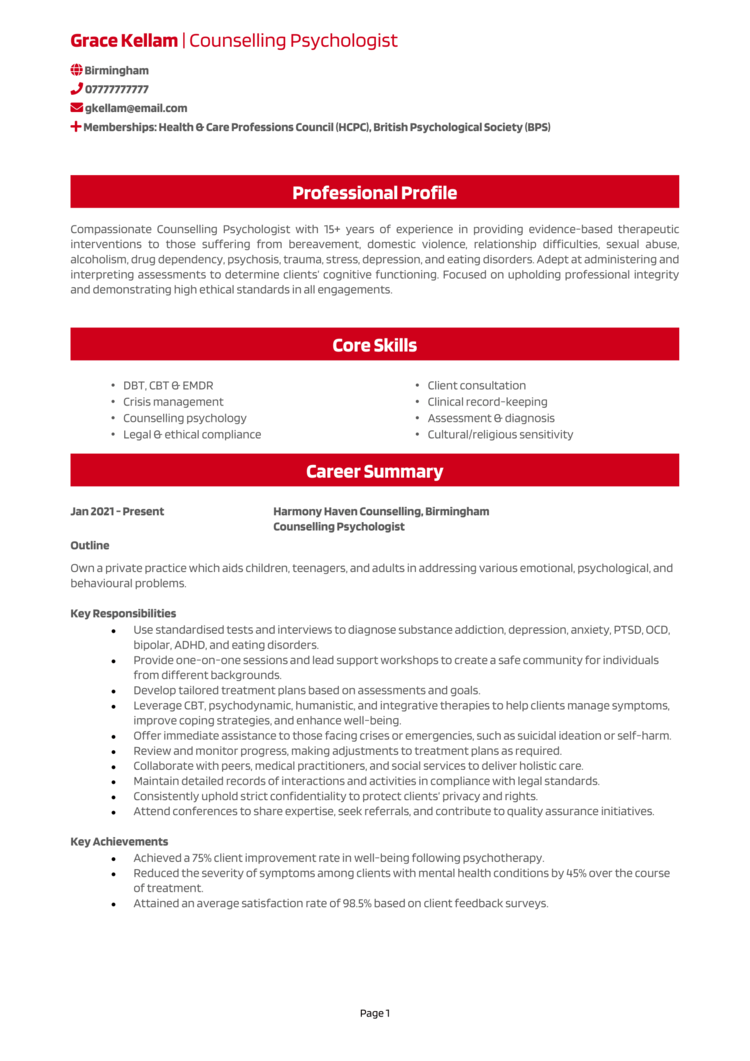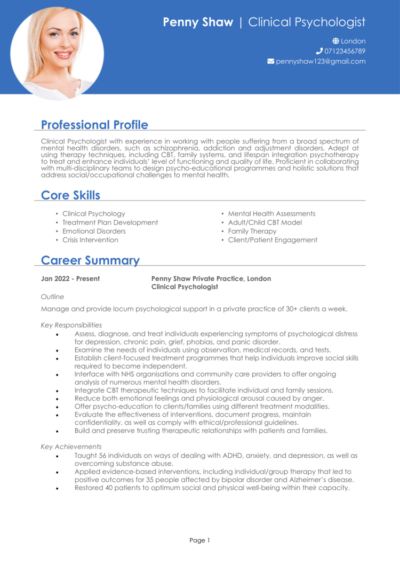Understanding people’s minds might be your superpower, but now it’s time to get inside the mind of a recruiter. As a psychologist, your CV needs to showcase your empathy, expertise, and analytical abilities – no pressure!
This helpful guide, complete with some Psychologist CV examples, will help you craft an application that highlights your clinical knowledge and counselling skills. With the right CV, you’ll land interviews, secure new roles, and make an even greater impact on people’s lives.
Psychologist CV

Assistant Psychologist CV

Counselling Psychologist CV

Forensic Psychologist CV

How to write your Psychologist CV
Learn how to create your own interview-winning Psychologist CV with this simple step-by-step guide.
Imagine your CV as a case study: every section is an opportunity to show how your skills, education, and experience work together to deliver results. Whether you’re aiming to counsel clients, conduct research, or support teams, this guide will help you write a CV that’s as insightful as your practice.
How to create a good structure for your Psychologist CV?


Think of your CV structure like a carefully crafted treatment plan – each section needs to build logically and lead to positive outcomes (like landing that dream job). Don’t force recruiters to go to any effort navigating an unclear CV – let them see your worth with ease
Here’s how to structure your Psychologist CV:
- Name and personal details – These contact details go right at the top so employers can contact you easily. You’re free to include a picture of yourself, but it’s always optional.
- Profile – Start with a brief summary of your psychological expertise, career highlights, and goals.
- Core skills – Then, highlight your technical and interpersonal abilities, like psychometric testing or CBT.
- Work experience – Detail your professional history in reverse chronological order, with the most recent first.
- Education – Showcase your academic qualifications and any relevant certifications, along with any relevant awards.
- Additional info – Optionally, include hobbies and interests that demonstrate empathy or problem-solving.
Psychologist CV format


An untidy CV format is like scribbled session notes – it’s hard to follow and doesn’t leave the best impression. Let’s tidy it up and make it a smooth read. A well-formatted CV ensures hiring managers focus on your expertise, not your layout mistakes.
Here’s how you can format your Psychologist CV effectively:
- Bullet points – Employ short, punchy bullet points to make responsibilities and achievements easy to read.
- Divide sections – Structure your CV with distinct sections that make the layout easy to scan.
- Use a clean font – Focus on readability with a professional design and font choice.
- Keep it the right length – No more than 2 pages in length, ensuring your highlights are front and centre while avoiding unnecessary fluff. Save any more for the cover letter.
How to write a Psychologist CV profile


Your CV profile is like the initial consultation – it sets the tone, builds trust, and convinces them you’re the perfect person to help them out. A good CV profile will adequately introduce yourself and demonstrate why you’re the perfect fit for the role.
Psychologist CV profile examples
Profile 1
Experienced Psychologist with six years of expertise in clinical settings, specialising in cognitive-behavioural therapy (CBT) for anxiety and depression. Skilled in conducting assessments, developing treatment plans, and supporting clients to achieve improved mental well-being.
Profile 2
Dedicated Educational Psychologist with four years of experience working in schools, focusing on supporting children with learning difficulties and behavioural challenges. Proficient in conducting assessments, creating intervention plans, and collaborating with educators and parents.
Profile 3
Proficient Organisational Psychologist with over eight years of expertise in workplace assessment and employee development. Skilled in implementing training programs, improving team dynamics, and enhancing workplace productivity through evidence-based strategies.
What to include in your Psychologist CV profile
Here are some tips on what to include in your Psychologist CV profile:
- Where you’ve worked – Mention healthcare organisations, private practices, or research institutions in your CV profile.
- Your top qualifications – Highlight degrees in psychology or mental health-related certifications.
- Specialised expertise – Quickly note areas like trauma therapy, child psychology, or neuropsychology.
- Client impact – Include details about the populations you’ve worked with or the results you’ve achieved.
- Research experience – Mention any studies or projects you’ve contributed to or led.
How should you write a core skills section?


Your CV skills section is where you highlight the abilities that make you an exceptional psychologist. In just a short bullet point section, the recruiter will be able to glean the precise skills you’ll be bringing to the table.
Tailor this section to the role, focusing on both technical and interpersonal skills.
Best skills for your Psychologist CV
- Psychological Assessment – Administering and interpreting standardised tests to evaluate cognitive, emotional, and behavioural conditions.
- Therapeutic Techniques – Applying evidence-based approaches such as CBT, DBT, or psychodynamic therapy to support client well-being.
- Crisis Intervention – Providing immediate support and strategies for individuals experiencing acute psychological distress.
- Diagnostic Expertise – Identifying mental health disorders using frameworks like DSM-5 or ICD-11.
- Research and Data Analysis – Designing studies and analysing data to contribute to advancements in psychological knowledge.
- Treatment Planning – Developing personalised intervention plans based on individual client needs and goals.
- Group Facilitation – Leading group therapy sessions or workshops to address shared challenges and promote collective growth.
- Ethical Practice – Maintaining confidentiality, informed consent, and professional boundaries in all client interactions.
- Cultural Competency – Adapting therapeutic approaches to respect and integrate clients’ cultural and societal contexts.
- Behavioural Modification – Designing and implementing strategies to encourage positive behavioural changes in clients.
Work experience


Your work experience section is where you demonstrate your practical application of psychological expertise. Detail your clinical, counselling, or research contributions in past roles, and list each of them in reverse chronological order.
Writing job descriptions for past roles

- Outline – Give a brief description of the organisation or project and your role.
- Responsibilities – Detail the key tasks like delivering therapy sessions, conducting assessments, or managing research projects.
- Achievements – Add measurable outcomes, such as patient satisfaction rates or published studies. Sprinkle in some numbers whenever possible.
Example jobs for Psychologist
Clinical Psychologist | MindBalance Therapy Specialists
Outline
Provided psychological therapy to individuals and groups at a private mental health clinic, focusing on anxiety, depression, and trauma recovery. Delivered personalised treatment plans tailored to client needs.
Responsibilities
- Conducted initial assessments to diagnose mental health conditions and establish treatment goals.
- Applied evidence-based therapies, including CBT and mindfulness techniques, to support clients.
- Maintained detailed client records, ensuring confidentiality and compliance with regulations.
- Collaborated with multidisciplinary teams to provide holistic care for clients.
- Delivered workshops on stress management and coping strategies for the community.
Achievements
- Improved client recovery rates by 30 percent through tailored therapy approaches.
- Reduced session dropout rates by 15 percent through enhanced engagement strategies.
- Recognised by colleagues for empathy and consistent positive client outcomes.
Educational Psychologist | BrightStart Schools
Outline
Worked within a network of primary and secondary schools to support students with special educational needs. Focused on identifying barriers to learning and implementing targeted interventions.
Responsibilities
- Conducted psychological assessments to identify learning and behavioural challenges.
- Developed intervention plans and strategies to support student development.
- Provided training for teachers and staff on managing classroom behaviours.
- Collaborated with parents and external agencies to ensure comprehensive support.
- Monitored and evaluated the effectiveness of interventions over time.
Achievements
- Increased academic performance by 20 percent for students with tailored intervention plans.
- Reduced behavioural incidents by 25 percent through effective staff training programs.
- Praised by educators for creating practical, evidence-based strategies to improve outcomes.
Psychologist | Peak Performance Consultancy
Outline
Supported corporate clients in improving workplace dynamics and employee performance for a business consultancy firm. Delivered evidence-based solutions to enhance productivity and morale.
Responsibilities
- Conducted workplace assessments to identify areas for improvement in team collaboration.
- Designed and delivered training programs to enhance leadership and interpersonal skills.
- Facilitated workshops on stress management and resilience for employees.
- Provided one-on-one coaching for managers to address specific challenges.
- Prepared detailed reports with actionable recommendations for organisational leaders.
Achievements
- Improved team productivity by 25 percent through targeted training initiatives.
- Increased employee satisfaction scores by 30 percent via enhanced workplace strategies.
- Recognised by clients for delivering measurable results in leadership development programs.
Education section


The education section is crucial for psychologists, as it demonstrates the qualifications that underpin your expertise.
Briefly make a note of your degrees, certifications, and any ongoing professional development. Highlight specific areas of focus, such as clinical psychology, counselling, or research methods.
Always list qualifications in reverse chronological order, starting with the most recent.
Best qualifications for Psychologists
- Doctorate in Clinical Psychology (DClinPsych) – Essential for practising as a clinical psychologist in the UK.
- MSc in Forensic Psychology – Demonstrates expertise in applying psychology to criminal justice settings.
- British Psychological Society (BPS) Chartership – Certifies professional recognition and competence.
- Diploma in Cognitive Behavioural Therapy (CBT) – Validates advanced training in delivering CBT interventions.
- Mental Health First Aid Certification – Highlights your ability to recognise and respond to mental health issues.





